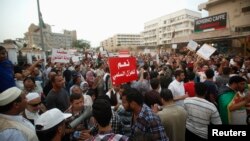TRIPOLI, LIBYA —
Libya is grappling with the decision this week by its congress to remove former Gadhafi-era officials from office. A top Islamist politician says disbarring them will help rebuild Libya, but some Libyans aren’t so sure.
The fallout is growing after Libya’s General National Congress bowed to revolutionary militiamen and approved a law disbarring from government a wide range of officials who worked for the former regime of Moammar Gadhafi.
There is worry the so-called "political isolation law" will add to a skills deficit in government and hinder the country moving forward rapidly. There also is concern the congress simply caved in to militiamen besieging key ministries demanding passage.
Rim Jibril, a 44-year-old visual artist who has been joining small anti-militia protests, said Libya won’t have enough experienced people to govern the country.
“I am with the political isolation in principle, but I am against the method they are going with because the way they are going with it, I think it will isolate more people than we can afford,” he said.
But Nizar Kawan, a Congress member from the Muslim Brotherhood’s Justice and Construction Party, said the isolation law is a cleansing action. He said that other countries have pursued similar courses following oppression or conflict.
“The United States also had its political isolation after the Civil War and a lot of those who fought with the South were politically isolated. It was very harsh, even harsher than this. So sometimes this does happen in history,” said Kawan.
How the political isolation law will work in practice remains unclear. A committee is planned to oversee its implementation.
It is difficult to calculate the number of people who will be barred from holding public office or working for the government for the next 10 years. It already has had an impact deterring foreign investors, though, and delaying the signing of government contracts for infrastructure repair and development.
Politician Mahmoud Jibril, a former Gadhafi-era planning minister and leader of a moderate coalition, predicted that half-a-million Libyans could lose posts. He said the law is unfair, as he and others who had worked for Gadhafi also were crucial in engineering his downfall.
Businessman and militia supporter Farag Alhamadi said there are plenty of people, however, who are ready to take the place of the holdovers.
“Libya is a country with capabilities. It is a young nation. There’s no lack or shortage of people who can fill these posts instead of using the people from the former regime. Why not use the young now to fill these posts?” asked Alhamadi.
Still, the militiamen want more. They are maintaining the ministry blockades, demanding that Prime Minister Ali Zeidan leave office.
The fallout is growing after Libya’s General National Congress bowed to revolutionary militiamen and approved a law disbarring from government a wide range of officials who worked for the former regime of Moammar Gadhafi.
There is worry the so-called "political isolation law" will add to a skills deficit in government and hinder the country moving forward rapidly. There also is concern the congress simply caved in to militiamen besieging key ministries demanding passage.
Rim Jibril, a 44-year-old visual artist who has been joining small anti-militia protests, said Libya won’t have enough experienced people to govern the country.
“I am with the political isolation in principle, but I am against the method they are going with because the way they are going with it, I think it will isolate more people than we can afford,” he said.
But Nizar Kawan, a Congress member from the Muslim Brotherhood’s Justice and Construction Party, said the isolation law is a cleansing action. He said that other countries have pursued similar courses following oppression or conflict.
“The United States also had its political isolation after the Civil War and a lot of those who fought with the South were politically isolated. It was very harsh, even harsher than this. So sometimes this does happen in history,” said Kawan.
How the political isolation law will work in practice remains unclear. A committee is planned to oversee its implementation.
It is difficult to calculate the number of people who will be barred from holding public office or working for the government for the next 10 years. It already has had an impact deterring foreign investors, though, and delaying the signing of government contracts for infrastructure repair and development.
Politician Mahmoud Jibril, a former Gadhafi-era planning minister and leader of a moderate coalition, predicted that half-a-million Libyans could lose posts. He said the law is unfair, as he and others who had worked for Gadhafi also were crucial in engineering his downfall.
Businessman and militia supporter Farag Alhamadi said there are plenty of people, however, who are ready to take the place of the holdovers.
“Libya is a country with capabilities. It is a young nation. There’s no lack or shortage of people who can fill these posts instead of using the people from the former regime. Why not use the young now to fill these posts?” asked Alhamadi.
Still, the militiamen want more. They are maintaining the ministry blockades, demanding that Prime Minister Ali Zeidan leave office.




